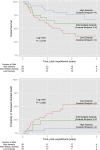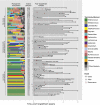The effects of intestinal tract bacterial diversity on mortality following allogeneic hematopoietic stem cell transplantation
- PMID: 24939656
- PMCID: PMC4133489
- DOI: 10.1182/blood-2014-02-554725
The effects of intestinal tract bacterial diversity on mortality following allogeneic hematopoietic stem cell transplantation
Abstract
Highly diverse bacterial populations inhabit the gastrointestinal tract and modulate host inflammation and promote immune tolerance. In allogeneic hematopoietic stem cell transplantation (allo-HSCT), the gastrointestinal mucosa is damaged, and colonizing bacteria are impacted, leading to an impaired intestinal microbiota with reduced diversity. We examined the impact of intestinal diversity on subsequent mortality outcomes following transplantation. Fecal specimens were collected from 80 recipients of allo-HSCT at the time of stem cell engraftment. Bacterial 16S rRNA gene sequences were characterized, and microbial diversity was estimated using the inverse Simpson index. Subjects were classified into high, intermediate, and low diversity groups and assessed for differences in outcomes. Mortality outcomes were significantly worse in patients with lower intestinal diversity; overall survival at 3 years was 36%, 60%, and 67% for low, intermediate, and high diversity groups, respectively (P = .019, log-rank test). Low diversity showed a strong effect on mortality after multivariate adjustment for other clinical predictors (transplant related mortality: adjusted hazard ratio, 5.25; P = .014). In conclusion, the diversity of the intestinal microbiota at engraftment is an independent predictor of mortality in allo-HSCT recipients. These results indicate that the intestinal microbiota may be an important factor in the success or failure in allo-HSCT.
© 2014 by The American Society of Hematology.
Figures


Comment in
-
Less (bacterial diversity) is more (deaths).Blood. 2014 Aug 14;124(7):995-6. doi: 10.1182/blood-2014-07-583906. Blood. 2014. PMID: 25124784 Free PMC article.
Similar articles
-
Clinical impact of pre-transplant gut microbial diversity on outcomes of allogeneic hematopoietic stem cell transplantation.Ann Hematol. 2017 Sep;96(9):1517-1523. doi: 10.1007/s00277-017-3069-8. Epub 2017 Jul 21. Ann Hematol. 2017. PMID: 28733895 Clinical Trial.
-
Intestinal domination and the risk of bacteremia in patients undergoing allogeneic hematopoietic stem cell transplantation.Clin Infect Dis. 2012 Oct;55(7):905-14. doi: 10.1093/cid/cis580. Epub 2012 Jun 20. Clin Infect Dis. 2012. PMID: 22718773 Free PMC article.
-
Microbiota as Predictor of Mortality in Allogeneic Hematopoietic-Cell Transplantation.N Engl J Med. 2020 Feb 27;382(9):822-834. doi: 10.1056/NEJMoa1900623. N Engl J Med. 2020. PMID: 32101664 Free PMC article.
-
The clinical role of the gut microbiome and fecal microbiota transplantation in allogeneic stem cell transplantation.Haematologica. 2021 Apr 1;106(4):933-946. doi: 10.3324/haematol.2020.247395. Haematologica. 2021. PMID: 33241674 Free PMC article. Review.
-
Intestinal Microbiota Influence Immune Tolerance Post Allogeneic Hematopoietic Cell Transplantation and Intestinal GVHD.Front Immunol. 2019 Jan 17;9:3179. doi: 10.3389/fimmu.2018.03179. eCollection 2018. Front Immunol. 2019. PMID: 30705680 Free PMC article. Review.
Cited by
-
Mitigation of gastrointestinal graft-versus-host disease with tocilizumab prophylaxis is accompanied by preservation of microbial diversity and attenuation of enterococcal domination.Haematologica. 2023 Jan 1;108(1):250-256. doi: 10.3324/haematol.2022.281309. Haematologica. 2023. PMID: 36106394 Free PMC article. No abstract available.
-
Nutritional modulation of the gut microbiome in allogeneic hematopoietic stem cell transplantation recipients.Front Nutr. 2022 Oct 20;9:993668. doi: 10.3389/fnut.2022.993668. eCollection 2022. Front Nutr. 2022. PMID: 36337625 Free PMC article. Review.
-
The Gut Microbiota and Immune System Relationship in Human Graft-versus-Host Disease.Mediterr J Hematol Infect Dis. 2016 May 1;8(1):e2016025. doi: 10.4084/MJHID.2016.025. eCollection 2016. Mediterr J Hematol Infect Dis. 2016. PMID: 27158438 Free PMC article. Review.
-
The Butyrogenic and Lactic Bacteria of the Gut Microbiota Determine the Outcome of Allogenic Hematopoietic Cell Transplant.Front Microbiol. 2020 Jul 22;11:1642. doi: 10.3389/fmicb.2020.01642. eCollection 2020. Front Microbiol. 2020. PMID: 32793150 Free PMC article. Review.
-
Alteration in the Skin Microbiome in Cutaneous Graft Versus Host Disease.Acta Derm Venereol. 2021 Jan 20;101(1):adv00374. doi: 10.2340/00015555-3613. Acta Derm Venereol. 2021. PMID: 32812057 Free PMC article.
References
-
- Copelan EA. Hematopoietic stem-cell transplantation. N Engl J Med. 2006;354(17):1813–1826. - PubMed
Publication types
MeSH terms
Substances
Grants and funding
LinkOut - more resources
Full Text Sources
Other Literature Sources

